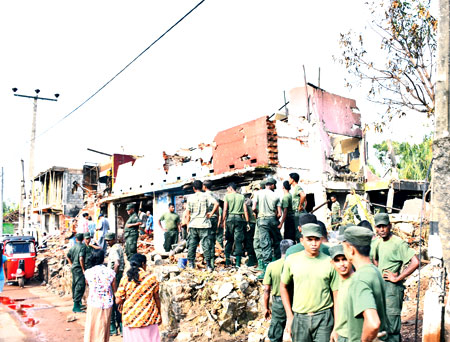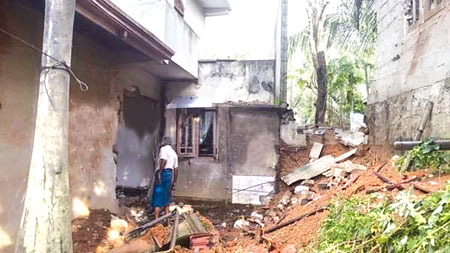|
Their homes are no more their sanctuary:
Salawa: impact on the people
by Carol Aloysius
Sri Lanka's biggest fire in recent years raged on June 5, 2016. On
that black Sunday, heavy artillery guns, small arms, and various
explosives in the ammunition storage at the Sri Lanka Army Camp at
Salawa, Kosgama, went up in flames. The force of the explosions
scattered the shattered pieces of leaded metal to surrounding villages
as far as five kilometres away, and, with them, shattered the dreams and
hopes of residents in the area.
 |
|
Pix : ANCL Media Library |
Rescue work began even as the flames were licking the skies.
Thousands of villagers were rushed from their homes and put into
makeshift camps for safety.
Yet, in the aftermath , just one week on, those residing in the
vicinity are still feeling the terrible impact the fire had on their
property, belongings, environment, livelihoods and health. Despite
efforts to allay their uncertainties of the future, they live in fear,
demanding assurance from the authorities for their safety and, most of
all, a promise that such a human-made disaster will not happen again.
It was these uncertainties that fuelled the protest of around 200
villagers who blocked the highway at Salawa Hospital Junction last week,
demanding answers and assurances.
Assurances had been given by the Sri Lanka Army of quick relief
measures: badly damaged houses to be reconstructed (of the 75 damaged,
fifty percent were extensively damaged and beyond repair, according to
Army sources), others to be renovated, and, cash compensation to be paid
to the victims.
Disturbing images
Other government institutions too have come forward to help. The
Water Board Chairman K. Ansar told the Sunday Observer he had
immediately dispatched bowsers and water tanks to provide clean water to
households. As of Sunday, the Board was resuming piped water services
while continuing to provide bowsers for people who needed to go back to
their homes, and begin the task of cleaning up the debris .
Disturbing images of people walking barefoot over pieces of shattered
glass, wood and scraps of gun powder metal however, have raised concerns
among Health Ministry officials.
Issuing a series of advisories to the Salawa residents, Director
General of Health Services, Dr P.G. Maheepala, has cautioned them
against drinking water from open wells that were exposed to the metal
fall-out until they were properly cleaned. He assures the public that
water from fully covered wells was safe.
 He has also said, those with breathing difficulties or any
respiratory disease should immediately seek medical treatment from a
nearby government hospital. He said, 25 ambulances had been deployed
currently, along with Public Health Inspectors to inspect all affected
areas. He has also said, those with breathing difficulties or any
respiratory disease should immediately seek medical treatment from a
nearby government hospital. He said, 25 ambulances had been deployed
currently, along with Public Health Inspectors to inspect all affected
areas.
Further information relating to the armory explosion and health
advice could be obtained by contacting the hotline 0113071073, he said.
Lead poisoning
Meanwhile, senior officials from the National Poisons Information
Unit of the General Hospital have expressed concern with regard to what
they described as , " very serious potential health impact in the long
run of exposure to gun powder lead poisoning".
Speaking on grounds of anonymity, they confirmed that studies had
already been done by researchers on harmful impact of lead found in
bullets and explosives. "They can contain harmful fumes like ozone
sulfur dioxide and metallic compounds that contain carcinogenic and
hormone disruption substances . Even if ingested or inhaled in low doses
over a long period, it can adversely affect human health", these sources
said.
Level of exposure
One substance, nitroglycerine , dilates the blood vessels and lowers
blood pressure.
Other adverse fall-out included lung irritation, eye infections like
conjunctivitis and redness of the eyes, as well as skin irritations and
dermatitis.
" However, the level of exposure can vary from person to person . The
effects are not the same for everyone", they said.
Pregnant women, foetus also in danger
lead exposure is harmful to the developing foetus, as the lead
crosses the placenta and is transmitted from the mother's blood stream
directly to the foetus; they said.
"Lead exposure could cause serious, irreversible complications,
including spontaneous abortion, premature membrane rupture, preclampsia,
pregnancy inducted hypertension and neuro behavioural effects on infants
and children. Even at low levels, lead is associated with pre term
delivery, congenital abnormalities , decreased birth weight, length and
head circumference", they said citing authoritative studies. |

